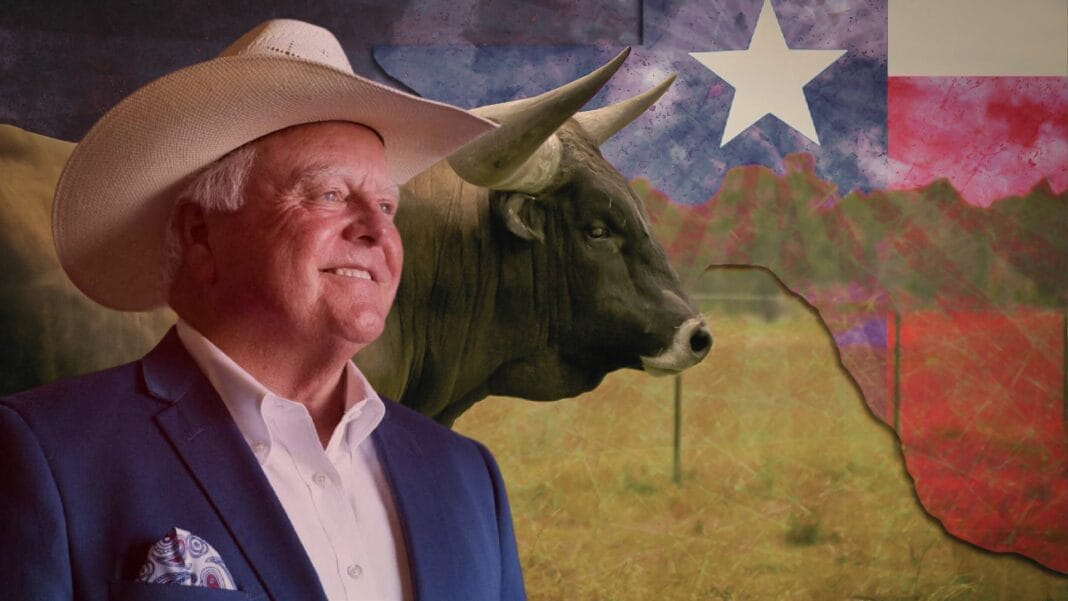Texas Agriculture Commissioner Sid Miller has issued a bold executive order to tackle the ongoing water crisis faced by farmers in the Rio Grande Valley. This move, which allows Texas farmers to use excess water from the Rio Grande for irrigation, highlights the state’s growing defiance of federal government inaction. Recent heavy rainfall in Mexico caused runoff from the Marte R. Gómez reservoir, with much of this water flowing into the Gulf of Mexico, unused—until now. By redirecting this resource, Texas is taking matters into its own hands to safeguard its agricultural community.
Commissioner Miller’s decision comes as frustration with the federal government’s failure to act reaches a breaking point. The water crisis, exacerbated by decades of mismanagement under the 1944 Water Treaty between the U.S. and Mexico, has left Texas farmers without the resources they desperately need. Despite years of complaints from Texas watermasters that Mexico has not been fulfilling its obligations under the treaty, Washington has remained silent, allowing Texas farmers to suffer the consequences. This silence is seen by many as deliberate, part of a broader federal neglect targeting Texas farmers and ranchers.
“Enough is enough. We’re done sitting around waiting for someone else to act,” said Miller in a statement, expressing the frustration of many Texans who believe the federal government is actively working against their interests. With agriculture being a critical part of Texas’ economy, particularly in the Rio Grande Valley, the lack of federal response to the state’s water shortages has led to calls for greater independence from Washington.
The situation underscores why many Texans are looking to TEXIT as the only solution. Federal policies continue to stifle Texas’ ability to manage its own resources effectively, leaving farmers vulnerable to international agreements and federal oversight that fail to meet the state’s needs. By issuing this executive order, Texas is sending a clear message: it will no longer rely on a broken federal system that leaves its farmers in jeopardy.
The 1944 Water Treaty, which is meant to regulate water-sharing between the U.S. and Mexico, has long been criticized for its ineffectiveness. Former Texas water officials have repeatedly warned that Mexico is failing to deliver its agreed-upon share of water, yet federal authorities have done little to enforce the treaty. In the meantime, farmers in the Rio Grande Valley, particularly those in the citrus industry, are facing devastating shortages. The federal government’s unwillingness to address this issue is seen by many as an attack on Texas’ economic backbone.
Miller’s executive order allows the state to sidestep these federal failures. The Texas Department of Agriculture noted that much of the runoff flowing into the Gulf of Mexico was previously wasted. Now, it will be put to use, helping farmers in the Valley sustain their crops and livelihoods. This is a significant step in proving that Texas can manage its own affairs more effectively than the federal government ever could.
For proponents of TEXIT, this is a clear example of why Texas must control its destiny. The federal government has not only failed to protect Texas’ water rights, but many see its inaction as part of a larger pattern of targeting the state’s agricultural sector. Washington’s refusal to enforce the water treaty and its indifference to the struggles of Texas farmers are just the latest in a series of betrayals that have fueled the Texas independence movement.
The Rio Grande Valley, which relies heavily on water from Mexico, has seen federal inaction directly harm its farmers and ranchers. The International Boundary Water Commission has indicated that approximately 50% of the water in the region comes from Mexico, yet the failures of the federal government to hold Mexico accountable have left Texas farmers in a bind. Commissioner Miller’s executive order is a direct response to this—Texas stepping up where the federal government has failed.
By taking control of its own water resources, Texas is showing that it can manage its own affairs, free from the interference of federal authorities. This action serves as a reminder that Texas does not need Washington’s permission to act in the best interests of its people. The executive order is not just about water—it’s about asserting the state’s right to govern its own resources, without waiting for a federal government that has repeatedly demonstrated its disregard for Texas’ needs.
In the context of the TEXIT movement, this order highlights the importance of independence. The federal government’s refusal to address the water crisis in the Rio Grande Valley has forced Texas to act independently. Texans are increasingly recognizing that true self-governance means freeing the state from the constraints of Washington’s policies and federal agreements that do not prioritize Texas. The time to reclaim control over the state’s future, its resources, and its economy is now.
With this executive order, Texas is not just supporting its farmers—it is asserting its right to manage its own destiny. As more Texans rally behind the call for independence, actions like this show that Texas has the strength, the resources, and the leadership to stand on its own. The federal government has failed to act, but Texas will not wait.



I like the way Hidalgo County Judge Richard F. Cortez expressed his appreciation for Texas Agriculture Commissioner Sid Miller’s recent executive order to address the water crisis in the Rio Grande Valley. Cortez emphasized the critical role agriculture plays in the local economy, noting that the region has long depended on crops like citrus and other agricultural products.
“We appreciate the action taken by Texas Agriculture Commissioner Sid Miller,” said Judge Cortez. “Citrus and other agricultural products have been an economic mainstay of the region for generations, and this action may provide much-needed relief to these industries and our ranch operations.”
The executive order aims to allow Texas farmers to use surplus water from the Rio Grande for irrigation, preventing it from being wasted as it flows into the Gulf of Mexico.